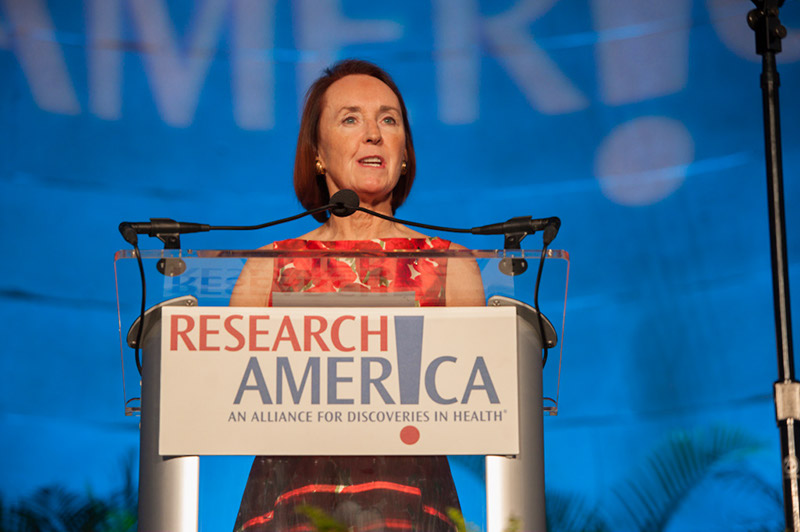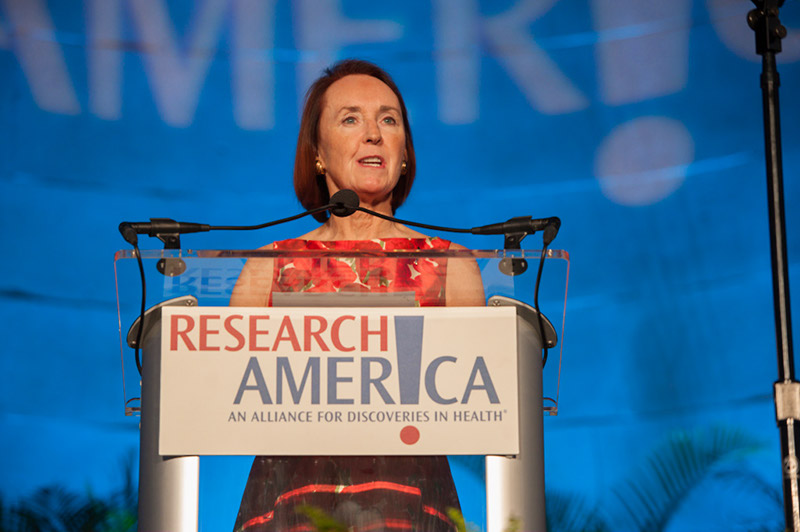Power to the Public


Dear Research Advocate,
Recently, I joined hundreds of attendees at the Aspen Institute’s annual Spotlight Health program. One recurring theme was the power of data to drive medical progress. David Blumenthal, president of the Commonwealth Fund, called digitized data a “natural resource; a pool that lies under the surface waiting to be extracted, refined and delivered [for better health and health care.]”
There was encouragement for more of us to become ‘data donors’ — when we are healthy as well as when we are ill — to help speed research and innovation. But significant obstacles to effectively ‘mining’ our data must be overcome. Technology is no longer a formidable one. Data privacy concerns remain, although speakers noted this is dissipating as a rate-limiting step (Research!America’s survey data reflects this). Perhaps more daunting is how to share data without disincentivizing data-dependent innovations. My own view is that if patients demand it, data sharing will happen. The pieces will fall into place. As President Lincoln memorably said: “Public sentiment is everything; without it nothing can succeed, with it nothing can fail.”
Public sentiment, including yours (that’s a hint), will play a role in whether the FY18 budget advances — or abandons — national priorities. As I mentioned last week, the House Budget Committee canceled plans to send a resolution for FY18 to the floor before leaving for the July 4th break. Despite House action on “test balloon” appropriations bills, more members of Congress from both sides of the aisle are calling for a bipartisan deal to raise the stifling FY18 budget caps. When Congress returns next week, we will send our 200+ organization letter advocating for such a deal. Get a head start: weigh in now.
Last Friday, President Trump nominated Dr. Jerome Adams to be the 20th Surgeon General of the United States. An anesthesiologist by training, Dr. Adams has an MPH from the University of California at Berkeley, an MD from the Indiana University School of Medicine, and a strong interest in combating the opioid epidemic. We are hopeful Dr. Adams will be confirmed quickly, because public health threats simply can’t wait.
As Dr. Adams experienced when he served as Indiana’s health commissioner, facing down a public health epidemic demands a community health approach. The nation can’t risk undercutting our already fragile community health system by eliminating the Prevention and Public Health Fund (PPHF), but thus far, every iteration of the ACA “repeal and replace” bill would do so. It’s all too easy to take public health for granted, so channel the power of public sentiment and Tweet your congressional delegation about the importance of the PPHF.
Two months ago I told you about a terrific article by Eric S. Lander and Eric E. Schmidt making a rock solid case for the “miracle machine” of basic science. They’ve now made a video to help further illustrate their point. I hope you will take a moment to watch it and then spread the news.
You may have heard rumors that the White House Office of Science and Technology Policy (OSTP) is no longer staffed; fortunately, this is not the case. A White House official said: “We have plenty of PhDs who are still on staff working on science.” The same source believes the president definitely is interested in hiring a director of OSTP. From another source, we heard that most of OSTP’s current staff are working on IT and/or national security issues.
How to interpret this intelligence? The Administration is putting science to work to advance some strategic objectives. Advocates must make the case for deploying it to advance all strategic objectives. Recent data from a survey we commissioned shows public support for putting science to work across the board. When we advocate for science as an asset essential to ensuring our nation’s strength, we are aligned with the president’s goals for strengthening the nation. That’s an opening. Let’s take it. The public is with us.
When it comes to connecting the dots between science and the national interest, no one does a better job than Research!America Board Member and UCSF Vice Chancellor for Science Policy and Strategy and Vice Dean for Research, Dr. Keith Yamamoto. Join the Coalition for the Life Sciences and the Congressional Biomedical Research Caucus for an NIH 101 briefing featuring Keith next Friday, July 14 at noon in 2043 Rayburn House Office Building. More here.
Sincerely,
Mary Woolley




